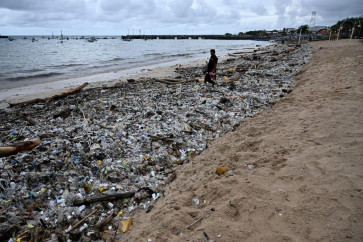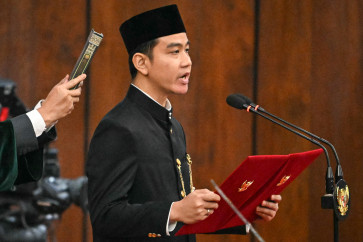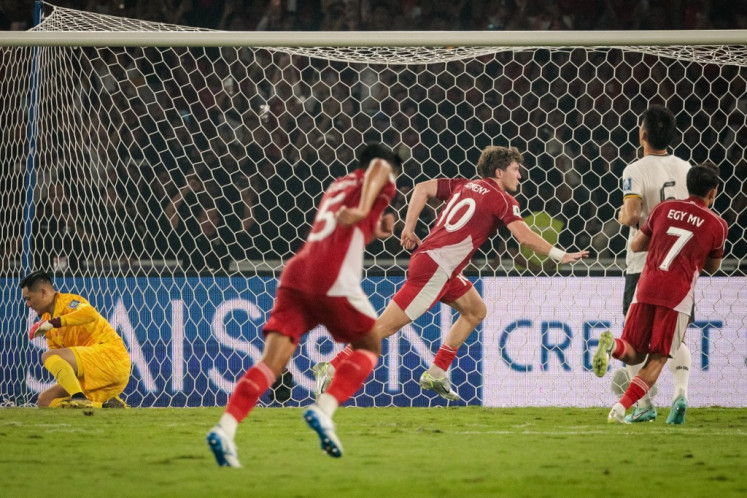NU rejects ‘radical’ label in history books
Point of contention: Sulamuddiniyah, an Islamic elementary school teacher in Gondek, Jombang regency, East Java, shows part of a textbook for fifth graders on Feb
Change text size
Gift Premium Articles
to Anyone

P
oint of contention: Sulamuddiniyah, an Islamic elementary school teacher in Gondek, Jombang regency, East Java, shows part of a textbook for fifth graders on Feb. 6 that has drawn controversy. The book lists Nahdlatul Ulama, the country’s largest Islamic organization, as a radical organization along with three other entities.(Antara/Syaiful Arif)
Nahdlatul Ulama (NU) — the largest Islamic group in the country which is now leading the war against religious extremism — was once considered a “radical” organization for its nonconformist attitude toward colonialism.
A state-commissioned history book for fifth-grade students describes the Islamic organization as such, but its current members are apparently irked by the “radical” reference in a textbook — even when it is used to explain the rise of Indonesian nationalism in the first decades of the 20th century.
Under the chapter “The Early Radical Era”, the book Peristiwa Dalam Kehidupan (Events in Life) classifies the NU as a “radical” group along with other revolutionary organizations, such as the Indonesian Union (PI), the Indonesian Nationalist Party and the Indonesian Communist Party (PKI).
The NU said the word was too loaded to be used now.
The group, established in 1926, has filed a complaint with the Education and Culture Ministry, demanding that the book be revised.
“The Nahdlatul Ulama executive body deeply deplored the use of the phrase ‘radical organization’ by the Education and Culture Ministry in the book. This phrase may give the wrong impression to students about the NU,” NU secretary general Helmy Faisal Zaini said as quoted by Antara.
He said the group was aware that the word “radical” was used in the context of Indonesia’s struggle against colonialism, but there was no guarantee it would not create misunderstanding if read by elementary school students.
Khoirul Anam, an editor at NU Online news portal, went as far as accusing the Education and Culture Ministry of “playing politics” by putting the NU and antigovernment groups in the same box.
“This is really dangerous,” he said.
The NU’s concern may not be entirely groundless.
In the past decade, Indonesia has seen the rise of radical Islamic groups linked to global jihadi movements such as Al-Qaida and the Islamic State group. Hizbut Tahrir, a nonviolent Islamic group that pushes for the creation of a transnational caliphate, has also gained traction in the country.
The NU, which touts itself as a bastion of moderate Islam, has for years been working to stem the tide of radicalism sweeping the country. It is only natural that it has described itself as anything but radical.
Following a meeting with concerned the NU leaders last week, the ministry decided to recall copies of the book.
“The ministry will recall the books as soon as possible and we will make a correction. The correction will then be published on the ministry’s official website,” Education and Culture Minister Muhadjir Effendy said during his visit to the Muhammadiyah Malang University in Malang, East Java, last week.
The minister said the book authors did not intend to equate the NU with contemporary radical groups. The book, he said, aimed to explain the pro-nationalist movement in the 1920s when Indonesian groups, including the NU, were seen as “radical” in their opposition to colonialism.
“But if we use the word ‘radical’ for students today, the word could go out of context and could lead to negative [perceptions],” he said.
The book, according to the minister, was first published in 2013 and has never been revised since then.
Some teachers said they did not even know the book was problematic.
Hariyanti, a teacher at Bandulan 2 state elementary school in Malang, said the school had received copies of the book in 2017 from the local education agency.
“I just found out about [the problematic content] after reporters came to the school asking about it,” she said.
Historian Bonnie Triyana said the NU’s objection was unsuitable and deplored the ministry’s decision to remove the word “radical”.
“We never learn history the right way. People often use the current understanding of a word to understand the past. That is wrong,” he said.
He argued that in the 1920s Indonesian revolutionaries who fought for national independence were in fact called radicals. “The word radical at the time did not have negative connotations as it does now.”
Indonesian radicals at the time were resisting a colonial government that was never elected by the Indonesian people, he said.
“That is how we got our independence.”
He said historical context was necessary to understand the use of certain words. He took for example the word “rebellion”. “There was a farmers’ rebellion against the Dutch colonial government in Banten […] If we reduce the meaning of ‘rebellion’ to the current understanding of it, it wouldn’t be right.”









